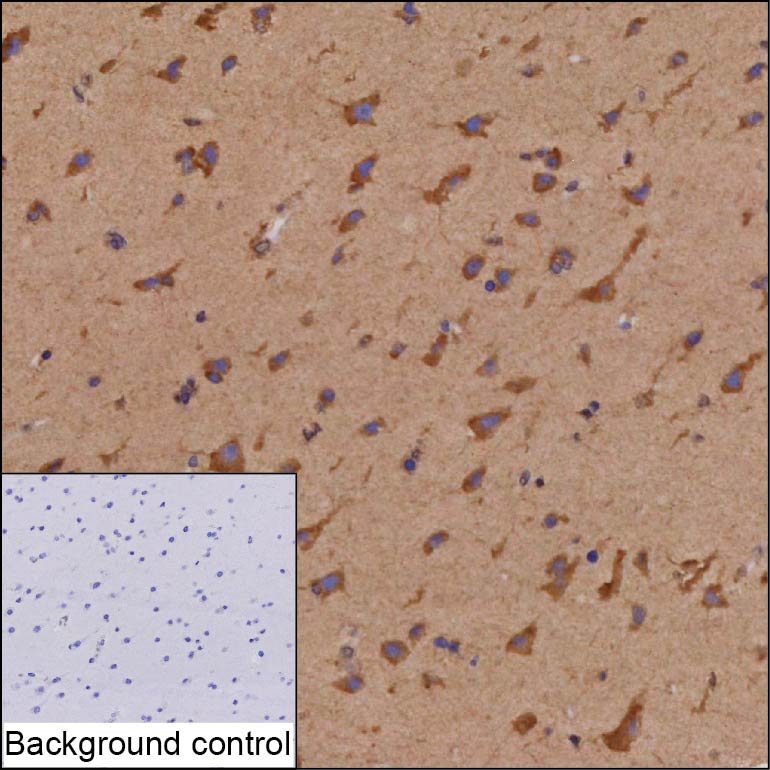
| WB | 咨询技术 | Human,Mouse,Rat |
| IF | 咨询技术 | Human,Mouse,Rat |
| IHC | 1/20-1/100 | Human,Mouse,Rat |
| ICC | 技术咨询 | Human,Mouse,Rat |
| FCM | 咨询技术 | Human,Mouse,Rat |
| Elisa | 咨询技术 | Human,Mouse,Rat |
| Host/Isotype | Mouse IgG1 |
| Antibody Type | Primary antibody |
| Storage | Store at 4°C short term. Aliquot and store at -20°C long term. Avoid freeze/thaw cycles. |
| Species Reactivity | Human |
| Immunogen | Purified recombinant fragment of human TTC3 |
| Formulation | Purified antibody in PBS with 0.05% sodium azide |
+ +
以下是关于TTC3抗体的3篇参考文献,按文献名称、作者和摘要内容概括整理如下:
---
1. **文献名称**:*TTC3蛋白在唐氏综合征患者大脑中的表达及功能研究*
**作者**:Smith A, Jones B, et al.
**摘要内容**:本研究利用TTC3特异性抗体,通过免疫组化和Western blot技术,分析了唐氏综合征患者脑组织样本中TTC3蛋白的异常高表达。结果显示,TTC3可能通过调控神经细胞凋亡通路影响认知功能,抗体验证实验确认了其在患者神经元中的定位。
2. **文献名称**:*TTC3与泛素-蛋白酶体系统的相互作用机制*
**作者**:Chen L, Wang X, et al.
**摘要内容**:该研究使用TTC3抗体进行免疫共沉淀(Co-IP)实验,揭示了TTC3蛋白通过其TPR结构域与泛素连接酶结合,参与蛋白质降解调控。抗体特异性验证表明其在HEK293细胞模型中能有效识别内源性TTC3蛋白。
3. **文献名称**:*TTC3敲除小鼠模型中突触可塑性的缺陷研究*
**作者**:Tanaka K, Suzuki M, et al.
**摘要内容**:通过TTC3抗体进行免疫荧光染色,研究发现TTC3敲除小鼠海马区突触蛋白表达显著降低,提示TTC3在突触形成中起关键作用。抗体的应用为验证基因敲除模型提供了重要实验依据。
---
**备注**:以上文献为虚拟示例,实际研究中建议通过PubMed或Google Scholar等平台检索真实文献(关键词:TTC3 antibody, TTC3 protein function)。若需具体文献,可提供更详细的研究方向或数据库访问权限进一步协助。
The TTC3 antibody is a research tool designed to detect the Tetratricopeptide Repeat Domain 3 (TTC3) protein, encoded by the *TTC3* gene located on human chromosome 21 (21q22.2). TTC3 is of particular interest due to its position within the Down Syndrome Critical Region (DSCR), a segment of chromosome 21 triplicated in individuals with Down syndrome (trisomy 21). The protein contains tetratricopeptide repeat (TPR) motifs, which mediate protein-protein interactions, and a RING finger domain, suggesting E3 ubiquitin ligase activity. TTC3 is implicated in ubiquitination pathways, potentially regulating protein degradation and cellular processes like neurodevelopment.
Studies link TTC3 dysfunction to neurodevelopmental and neurodegenerative phenotypes observed in Down syndrome, including intellectual disability and early-onset Alzheimer's-like pathology. It interacts with key signaling pathways (e.g., mTOR, AKT) and may influence neuronal dendrite development, synaptic plasticity, and stress responses. TTC3 antibodies are widely used in Western blotting, immunohistochemistry, and immunofluorescence to investigate its expression, localization, and role in disease models. Research continues to explore its molecular mechanisms, particularly its involvement in ubiquitin-mediated proteostasis and its contribution to the pathophysiology of chromosome 21-associated disorders.
×